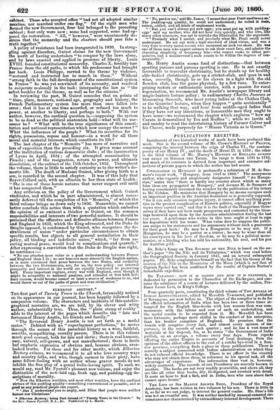ELITERTON RECTORY. * Tun first part of Twenty Years in the
Church, favourably noticed on its appearance in our journal, has been happily followed by a companion volume. The characters and incidents of this autobio- graphical narrative are, we are told, by its clever and witty author, substantially true. Thus, the " plain stamp of reality " adds to the interest of the pages which describe the " fate cull fortunes of Henry Austin, his friends and family." "The Reverend Henry Austin is not set forth as a model rector." Debited with no " superlayman perfections," he moves through the scenes of this parochial history as a wise, faithful, sensible, sympathizing, country parson. There is in this volume much good counsel, both for laic and cleric ; there is real humour, easy, natural, self-grown, and not manufactured ; there is facile but emphatic expression of obvious and, because obvious, over- looked truths. For these and for other merits, which Elkerton _Rectory evinces, we recommend it to all who love country ways and country folks, and who, though earnest in their piety, have some fellow-feeling with an author whose graver moods do not inhibit the free play of a genial frolic-loving spirit. To such we would say, read Mr. Pyoroft's pleasant new volume, and enjoy the distinction of the new-laid egg, fresh egg, and pudding-egg de- scriptions of morality.
"Now the Elkerton worthies, and most other worthies, have the cardinal virtues of this pudding quality—something conventional or passable, and as good as any practical people can expect.
" i
But I understand you to imply, said Ellen that people were neither honest nor Christians.'
• Elkertax Rectory ; tieing Part Second of " Twenty Years in the Church." By the Rev. James Pyeroft. B.A., &c. Published by L. Booth.
" No, pardon me,' said Mr. James, ' I meant that poor Pratt used to say so.' The pudding-egg quality, he could not understand; he called it stale, rotten, addled, and all kinds of unpleasant words.
But ut you can't always get new eggs ; you must put up with pudding- eggs' said my mother, who did not hear very, quickly, and who also, like many other reasoners, was apt to mistake the illustration for the argument. " Precisely what I meant, and precisely what Mr. Pratt could never understand. He set out with a high standard of ideal virtue, and was a very Cato to every moral recruit who measured an inch too short. He was one of those men who expect cabmen to ask their exact fare, and admire the charming simplicity of fourpenny bits—who expect cooks to abhor per- quisites, and a maidservant's male cousin to be within the degrees of con- sanguinity."
Mr. Henry Austin seems fond of distinctions—that between sporting parsons and parsons sporting is one. He is not exactly favourable to muscular christianity, but he stands up for healthy able-bodied christianity, gets up a cricket-club, and 'goes in and wins, inorally, though he or his eleven in a fight with the old Bowden club, lose the game physical, by a few runs. To enter- prising rectors or enthusiastic curates, with a passion for rural regeneration, we recommend Mr. Austin's newspaper library and magic-lantern lecture policy ; to rudimentary Charles Jameses or blossoming Samuels, who meet young ladies at the Clcithes Club, or the Quarries' lecture, when they happen " quite accidentally " to be walking that way, and hear from middle-aged ladies that if they have not any intentions, as honourable men they ought to have some—we recommend the chapter which explains how my Curate is demoralized by Tea and Muffins" ; while we invite all and sundry to read the entertaining history of Farmer Culver and his Cheese, made purposely for " Missus 'Victoria as is Queen."


























 Previous page
Previous page